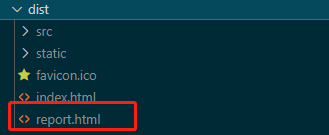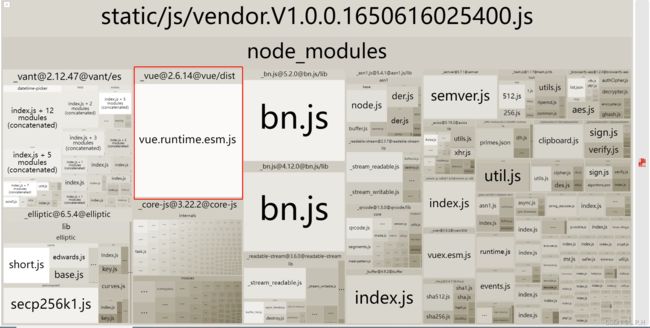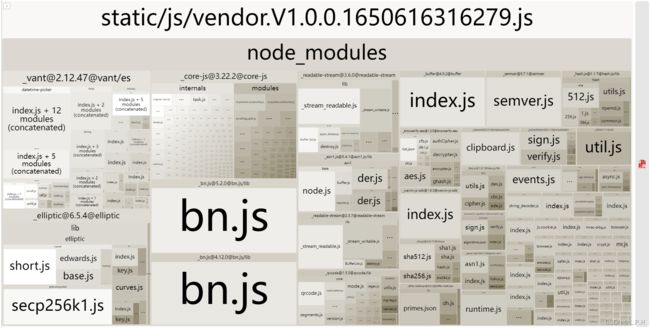vue-cli打包之性能优化
常见的vue打包及性能优化方案:
最近在搞vue-cli打包以及性能优化,下面是我采用的几种方式,希望给各位小伙伴带来帮助。
1.配置路由懒加载
const router = [
path: '/home/***(路由路径)',
name: '路由名称',
component: () => import('@/views/Home/***.vue'),
meta: { title: '组件标题' }
]
该方式是通过 import()的方式实现路由的懒加载,不用在界面加载的时候一次性直接导入全部的路由。而是通过按需引入,使用哪个页面就加载哪个页面,可以很好的提高运行速度,减少首页加载的时间。
2.使用keep-alive缓存组件
<template>
<div>
<keep-alive>
<component />
</keep-alive>
</div>
</template>
该方法是将组件通过缓存的方式对组件进行持久化,避免多次渲染,可以用于不经常改变的组件。
3.第三方插件按需引入
import { Lazyload } from 'vant'
import { Button } from 'element-ui';
Vue.use(Lazyload, {})
Vue.use(Button)
使啥用啥,不用全部导入
4.使用cdn加速
let cdn = {
css: [
//雪碧图样式
"https://**/**/icon.css",
],
js: [
'https://cdn.bootcdn.net/ajax/libs/vue/3.2.33/vue.cjs.js',
'https://cdn.bootcdn.net/ajax/libs/vuex/4.0.2/vuex.cjs.min.js',
'https://cdn.bootcdn.net/ajax/libs/vue-router/4.0.14/vue-router.cjs.min.js',
'https://cdn.bootcdn.net/ajax/libs/axios/0.26.1/axios.js',
'https://cdn.bootcdn.net/ajax/libs/core-js/3.22.0/minified.js'
],
}
//判断是否是生产环境
const isProd = process.env.NODE_ENV === "production"
cdn = isProd ? cdn : {css:[],js:[]};
module.exports = {
configureWebpack: {
// 采用cdn的方式,所以将以下这些文件配置不打包
externals:{
vue:"Vue",
'vue-router': 'VueRouter',
vuex: 'Vuex',
axios:'axios',
'core-js':'core-js',
vant:'vant'
},
}
chainWebpack:config => {
// 注入cdn
config.plugin("html").tap(args => {
args[0].cdn = cdn
return args
})
}
}
然后在index.html中注入cdn
<!DOCTYPE html>
<html lang="zh-Hans">
<head>
<!-- 使用CDN的CSS文件 -->
<% for (var i in htmlWebpackPlugin.options.cdn && htmlWebpackPlugin.options.cdn.css) { %>
<link href="<%= htmlWebpackPlugin.options.cdn.css[i] %> " rel="stylesheet">
<% } %>
</head>
<body>
<noscript>
<strong>We're sorry but app doesn't work properly without JavaScript enabled. Please enable it to continue.</strong>
</noscript>
<div id="app"></div>
<!-- 使用CDN的JS文件 -->
<% for (var i in htmlWebpackPlugin.options.cdn && htmlWebpackPlugin.options.cdn.js) { %>
<script src="<%= htmlWebpackPlugin.options.cdn.js[i] %>" defer></script>
<% } %>
</body>
</html>
5.公共代码抽离
//vue.config.js
module.exports = {
configureWebpack: {
optimization:{
splitChunks: {
cacheGroups: {
vendor: {
//第三方库抽离
chunks: "all",
test: /node_modules/,
name: "vendor",
minChunks: 1, //在分割之前,这个代码块最小应该被引用的次数
maxInitialRequests: 5,
minSize: 0, //大于0个字节
priority: 100 //权重
},
common: {
//公用模块抽离
chunks: "all",
test: /[\\/]src[\\/]utils[\\/]/,
name: "common",
minChunks: 1,
maxInitialRequests: 5,
minSize: 0, //大于0个字节
priority: 60
},
// styles: {
// //样式抽离
// name: "styles",
// test: /\.(sa|sc|c)ss$/,
// chunks: "all",
// enforce: true
// },
runtimeChunk: {
name: "manifest"
}
}
}
}
}
}
6.去除console.log
首先需要下载一个插件terser-webpack-plugin
npm i terser-webpack-plugin -D
然后直接在vue.config.js里面使用
module.exports = {
chainWebpack:config => {
if(process.env.NODE_ENV === "production"){
// 去除console.log输出
config.optimization
.minimizer('terser')
.tap(args => {
Object.assign(args[0].terserOptions.compress, {
// 生产模式去除console.log
pure_funcs: ['console.log']
})
return args
})
}
}
}
然后打包之后运行就可以知道效果了
//打包命令
npm run build
7.不知道哪些插件需要排除进行cdn引入的,可以使用这个命令打包生成打包报告
//package.json
{
"scripts": {
"report": "vue-cli-service build --report --mode production"
},
}
使用命令
npm run report
打包之后在dist文件夹里面会生成report.html文件

然后在浏览器打开这个html文件会显示这个

然后我们看到这个vue这么白,还这么大,说明他没有什么错综复杂的关系,因此可以使用cdn加速,打包时可以排除掉,排除方法见上面的方法4.cdn加速
我们排除完之后再去看报告

发现vue已经没有了,而且包的体积也减少了不少。
还想要排除啥可以自己琢磨琢磨。
8.gzip压缩
下载插件 compression-webpack-plugin
npm i compression-webpack-plugin -D
配置vue.config.js
const CompressionPlugin = require('compression-webpack-plugin');
module.exports = {
configureWebpack:config=>{
if(process.env.NODE_ENV=='production'){
return{
plugins: [
new CompressionPlugin({
algorithm: 'gzip', // 使用gzip压缩
test: /\.js$|\.html$|\.css$/, // 匹配文件名
filename: '[path].gz[query]', // 压缩后的文件名(保持原文件名,后缀加.gz)
minRatio: 1, // 压缩率小于1才会压缩
threshold: 1024*10, // 对超过10k的数据压缩
deleteOriginalAssets: false, // 是否删除未压缩的源文件
}),
],
}
}
}
}
不过我们前端开启gzip后,也需要配置下nginx的gzip开启,要不然是没法使用的
//找到nginx的这个文件 /usr/local/nginx/conf/nginx.conf 然后配置
server {
listen 4300;
server_name localhost;
location / {
root /home/static/web/wechat;
index /index.html;
try_files $uri $uri/ /index.html;
gzip_static on; #开启压缩
}
}
其实我们在打包的时候就可以看到gzip包的大小了

如上,小了将近三倍。
不过,一般我们就不要配置这个gzip压缩了,一般后端都是会给我们弄的,我们直接上传到服务器就可以了,会自动给我们压缩的,在浏览器上就是这样显示。
